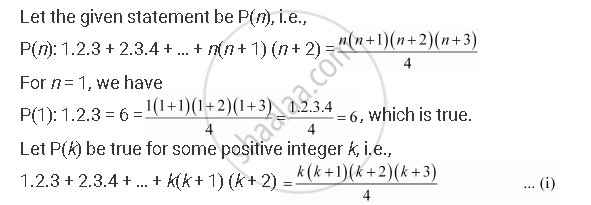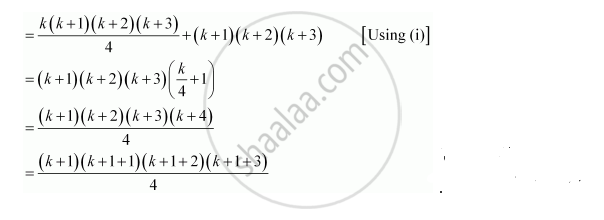Advertisements
Advertisements
प्रश्न
Prove the following by using the principle of mathematical induction for all n ∈ N: 1.2.3 + 2.3.4 + … + n(n + 1) (n + 2) = `(n(n+1)(n+2)(n+3))/(4(n+3))`
उत्तर

We shall now prove that P(k + 1) is true.
Consider
1.2.3 + 2.3.4 + … + k(k + 1) (k + 2) + (k + 1) (k + 2) (k + 3)
= {1.2.3 + 2.3.4 + … + k(k + 1) (k + 2)} + (k + 1) (k + 2) (k + 3)

Thus, P(k + 1) is true whenever P(k) is true.
Hence, by the principle of mathematical induction, statement P(n) is true for all natural numbers i.e., n.
APPEARS IN
संबंधित प्रश्न
Prove the following by using the principle of mathematical induction for all n ∈ N:
`1 + 3 + 3^2 + ... + 3^(n – 1) =((3^n -1))/2`
Prove the following by using the principle of mathematical induction for all n ∈ N:
`1^3 + 2^3 + 3^3 + ... + n^3 = ((n(n+1))/2)^2`
Prove the following by using the principle of mathematical induction for all n ∈ N: `1/2 + 1/4 + 1/8 + ... + 1/2^n = 1 - 1/2^n`
Prove the following by using the principle of mathematical induction for all n ∈ N:
Prove the following by using the principle of mathematical induction for all n ∈ N:
`(1+ 1/1)(1+ 1/2)(1+ 1/3)...(1+ 1/n) = (n + 1)`
Prove the following by using the principle of mathematical induction for all n ∈ N: n (n + 1) (n + 5) is a multiple of 3.
If P (n) is the statement "n(n + 1) is even", then what is P(3)?
If P (n) is the statement "n3 + n is divisible by 3", prove that P (3) is true but P (4) is not true.
If P (n) is the statement "n2 − n + 41 is prime", prove that P (1), P (2) and P (3) are true. Prove also that P (41) is not true.
1 + 2 + 3 + ... + n = \[\frac{n(n + 1)}{2}\] i.e. the sum of the first n natural numbers is \[\frac{n(n + 1)}{2}\] .
1 + 3 + 32 + ... + 3n−1 = \[\frac{3^n - 1}{2}\]
1.3 + 2.4 + 3.5 + ... + n. (n + 2) = \[\frac{1}{6}n(n + 1)(2n + 7)\]
a + ar + ar2 + ... + arn−1 = \[a\left( \frac{r^n - 1}{r - 1} \right), r \neq 1\]
52n+2 −24n −25 is divisible by 576 for all n ∈ N.
\[\frac{(2n)!}{2^{2n} (n! )^2} \leq \frac{1}{\sqrt{3n + 1}}\] for all n ∈ N .
Show by the Principle of Mathematical induction that the sum Sn of then terms of the series \[1^2 + 2 \times 2^2 + 3^2 + 2 \times 4^2 + 5^2 + 2 \times 6^2 + 7^2 + . . .\] is given by \[S_n = \binom{\frac{n \left( n + 1 \right)^2}{2}, \text{ if n is even} }{\frac{n^2 \left( n + 1 \right)}{2}, \text{ if n is odd } }\]
Prove by method of induction, for all n ∈ N:
2 + 4 + 6 + ..... + 2n = n (n+1)
Prove by method of induction, for all n ∈ N:
3 + 7 + 11 + ..... + to n terms = n(2n+1)
Prove by method of induction, for all n ∈ N:
12 + 32 + 52 + .... + (2n − 1)2 = `"n"/3 (2"n" − 1)(2"n" + 1)`
Prove by method of induction, for all n ∈ N:
3n − 2n − 1 is divisible by 4
Prove by method of induction, for all n ∈ N:
5 + 52 + 53 + .... + 5n = `5/4(5^"n" - 1)`
Prove by method of induction, for all n ∈ N:
Given that tn+1 = 5tn + 4, t1 = 4, prove that tn = 5n − 1
Answer the following:
Prove, by method of induction, for all n ∈ N
8 + 17 + 26 + … + (9n – 1) = `"n"/2(9"n" + 7)`
Answer the following:
Prove, by method of induction, for all n ∈ N
12 + 42 + 72 + ... + (3n − 2)2 = `"n"/2 (6"n"^2 - 3"n" - 1)`
Answer the following:
Prove by method of induction 52n − 22n is divisible by 3, for all n ∈ N
The distributive law from algebra says that for all real numbers c, a1 and a2, we have c(a1 + a2) = ca1 + ca2.
Use this law and mathematical induction to prove that, for all natural numbers, n ≥ 2, if c, a1, a2, ..., an are any real numbers, then c(a1 + a2 + ... + an) = ca1 + ca2 + ... + can.
Prove by induction that for all natural number n sinα + sin(α + β) + sin(α + 2β)+ ... + sin(α + (n – 1)β) = `(sin (alpha + (n - 1)/2 beta)sin((nbeta)/2))/(sin(beta/2))`
Prove by the Principle of Mathematical Induction that 1 × 1! + 2 × 2! + 3 × 3! + ... + n × n! = (n + 1)! – 1 for all natural numbers n.
Prove the statement by using the Principle of Mathematical Induction:
32n – 1 is divisible by 8, for all natural numbers n.
Prove the statement by using the Principle of Mathematical Induction:
n3 – n is divisible by 6, for each natural number n ≥ 2.
Prove the statement by using the Principle of Mathematical Induction:
n(n2 + 5) is divisible by 6, for each natural number n.
A sequence b0, b1, b2 ... is defined by letting b0 = 5 and bk = 4 + bk – 1 for all natural numbers k. Show that bn = 5 + 4n for all natural number n using mathematical induction.
Prove that number of subsets of a set containing n distinct elements is 2n, for all n ∈ N.
If xn – 1 is divisible by x – k, then the least positive integral value of k is ______.
If P(n): 2n < n!, n ∈ N, then P(n) is true for all n ≥ ______.
